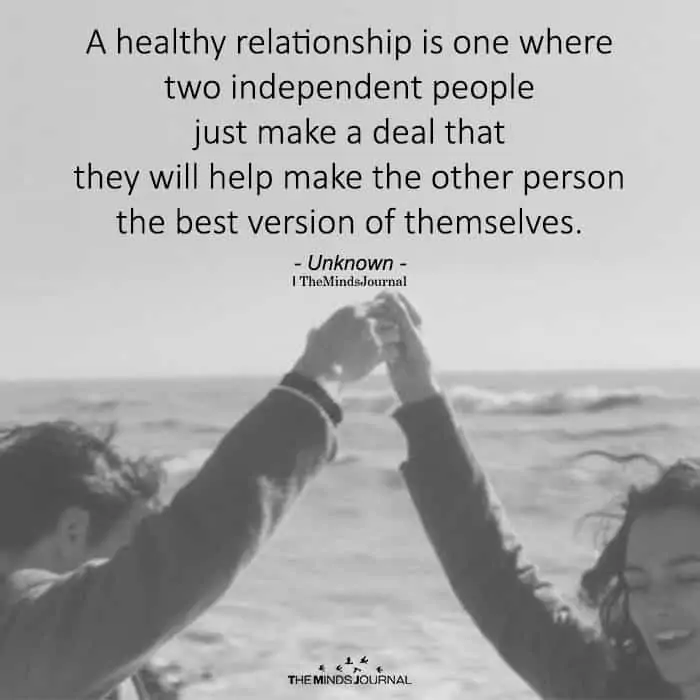If you’re one of those people who never in a healthy, fulfilling relationship, it’s possible you may not even know what having one looks like.
Perhaps your parent’s marriage wasn’t good, and you have no positive relationship role model to draw from. Maybe your relationship with both of them wasn’t the best either, causing you to form some insecure attachment patterns that keep playing out over and over.
Regardless of the reason, it is possible for you to break the mold and stop repeating these unhealthy relationship experiences.
To do so, you must be armed with knowledge, insight, and a personal goal to recognize the differences between toxic or unhealthy relationships and a healthy, functional relationship with a positive romantic partner.
If you’ve never had a healthy relationship, per se, this task might be a bit tricky.
There’s a good chance you can look back on your past relationships and recognize that you’ve made some inappropriate or poor choices.
But, knowing what “healthy” means, in theory, is different than knowing what a healthy relationship feels like from the inside.
Healthy relationships are balanced and reciprocal. There should be a feeling of equality regarding the effort you each make to create a successful union.
For instance, you should both take an interest in each other, show gratitude for each other, and hold each other in high regard.
If your partner isn’t bringing out the best in you or you can’t count them, alarms bells should go off.
Healthy, functional, and thriving relationships have these qualities:
1. Trust and honesty.
Trust is vital and foundational to your relationship. You should feel confident your partner has your best interest at heart and will not do anything to harm you. You should feel they are trustworthy and honest based on their behavior and what they say.
You should always give the benefit of the doubt until you see, hear, or know otherwise. You should not be worried that if you are honest and forthcoming too that there will be a negative consequence.
Related: 5 Signs You’ve Got A Spiritually Healthy Relationship
2. Communication and commitment to resolving conflict.
There should be open, productive, and respectful communication, even during conflict. There should be no insults, intimidation, or abuse of any sort. It should always feel safe for you to bring your issues and concerns to your partner, and they should feel the same way toward you.
3. Shared and/or similar values.
Values are more important than (and not the same thing as) similar interests. You should both see eye to eye on core beliefs about things such as monogamy, commitment, children, careers, religion, substance usage, asking for help, how time is spent, where to live, life goals, and so on.
You should also be in agreement on the boundaries between you and others in your circle (such as friends and family). You should enjoy spending time together, but there’s also room to be yourself outside of the relationship. If either of you feels you are doing something that goes against your core values, you will have intense friction and unhappiness.

4. Mutual sharing of your inner worlds.
You both should be sharing your history — the good, the bad, and the ugly. Share events that have happened to you both past and present. Communicate your fears and troubles, your family history, and so on.
Sharing should happen in a gradual and measured way. Get a sense of the reaction. Are your disclosures met with empathy and compassion each time? If the response doesn’t feel right, are you able to give feedback, and does this person course correct?
When your trust was shattered by those who were supposed to take care of you in the past, talking about these details can be difficult. But if you choose to shut down and not share, it will result in distance and disconnect between you.
5. Empathy.
You should both be kind-hearted and caring toward each other. You should be able to lean on each other and be supportive. You should both feel bad and apologize for things you do wrong to each other. You should both feel a sense that your best interest is at heart.
You value and discuss each other’s beliefs and opinions. There is no one-up/one-down position, and you both should feel like equals. You can understand each other’s perceptions of a situation even if you don’t agree. This may not happen all the time, but it should most of the time.
Related: 9 Thoughts That Prove You’re In A Genuinely Healthy Relationship
6. Physical intimacy.
Unique to a romantic relationship, as opposed to a platonic friendship, you should also share physical intimacy and affection. The relationship should evolve at a comfortable pace with neither of you pressuring the other for sex or commitment too soon.
Also, realize that developing physical intimacy is both easier than and different from developing emotional intimacy. With emotional intimacy, you both feel close and connected from the sharing of feelings, expressing understanding, affirming each other, and showing you care. Emotional intimacy should come before, or at the very least, keep pace with, physical intimacy.
Here are seven tips to help you recover from relationship déjà vu and find a healthy, loving relationship even if you’ve never had one before:
1. Pay attention to your intuition and gut feelings.
Your instinctive feelings, the ones that are underneath the fear (about being alone, abandoned, that you’re unlovable or unworthy), are your “relationship antennas.” Doubts about your worth and lovability are not rational. That’s what was conditioned when you were left, mistreated, not responded to, and so on.
Your intuition is the voice of your subconscious that powerfully weaves your mind, body, and spirit together. Listen to it by meditating on a question you have and directly ask yourself what your gut is trying to tell you. Your gut will be able to tell you if you are in a healthy relationship or not.
2. Don’t let your emotions run the show.
Learn self-soothing strategies. Fear and panic can trigger you towards fight or flight.
If you think you are not being attended to by a partner, you might act inappropriately. You might lash out, escalate, withdraw, or test your partner’s love. You don’t need incessant validation from someone else.
You can learn to calm yourself, validate yourself, and change your negative self-talk. You can also express yourself assertively.
3. Make some personal changes.
Look at your own bad habits and behaviors. Are you passive? Dramatic? Negative? Never satisfied?
Take an honest self-inventory to determine how you might be contributing to the repetitive dynamics you find yourself in.
What would you want to change whether in a relationship or not? Is there a familiar theme to the feedback you get from romantic partners, friends, colleagues that you need to list too?
Related: Relationships & Self-Love: 9 Self-Love Rules In A Healthy Relationship
4. Refuse to tolerate emotional invalidation from others.
When your thoughts and feelings are rejected, ignored, or negatively judged, you are experiencing what’s called “emotional invalidation.”
Many adults who struggle in romantic relationships have often been a victim to some degree of experiencing such invalidation as children. You may find your thoughts and feelings often dismissed or minimized by others as an adult now too.
The antidote is to practice self-acceptance and self-compassion. Affirm your right to heal and to have a happy and healthy relationship.
5. Be careful not to create a self-fulfilling prophecy.
If you think you are going to be ghosted, breadcrumbed, cushioned, or stashed because that’s your patterned romantic history, don’t assume it is going to keep happening.
Take a look at ways you might actually be creating this outcome by sabotaging or accepting the wrong type of partner. What you predict will happen may come to fruition just because you believe it will. Your beliefs influence your actions. To manifest a positive mindset will be much more advantageous.
Expect something different regardless of whether you have experienced it before today.
6. Don’t get stuck in a self-defeating mindset.
Similar to self-fulfilling prophecies, irrational, self-defeating thoughts will sabotage your effort to find a fulfilling relationship.
Do not believe a negative thought is true without fact-checking. For example: believing you can’t change, thinking all men/women are alike, saying to yourself that nothing you do will work or that you’re too old to change, and so on, will keep you stuck and hopeless.
At the very least, if you can’t be positive, at least be neutral, open, and curious that you can change, and that your life can be different.
7. Refuse to accept bad behavior.
Your partner should be free of chemical abuse or addictions to anything – porn, alcohol, sex, drugs, gambling, video games, and so on. This will not make an emotionally available, transparent, consistent, and reliable partner.
You should never feel unsafe or threatened in any way whatsoever. You should also never be controlled or abused emotionally, verbally, economically, and of course, physically. If you are not sure what all of these forms of abuse are, educate yourself and be clear on the signs to look for.
When you’ve learned early in life that others are untrustworthy, unresponsive, or even abusive, chances are you are now choosing a similar type of person as an adult. It can be a real struggle to break free from the comfort and familiarity of it all.
However, making profound changes and a full recovery is possible.
Having a healthy relationship, even if you haven’t had one before, is absolutely achievable.
You can learn what to look for and what it should feel like. And you shouldn’t settle for less.
Written By Marni Feuerman Originally Appeared In YourTango








